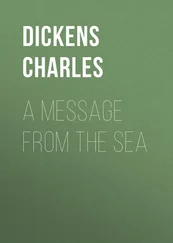Charles Dickens - Tales from Dickens
Здесь есть возможность читать онлайн «Charles Dickens - Tales from Dickens» — ознакомительный отрывок электронной книги совершенно бесплатно, а после прочтения отрывка купить полную версию. В некоторых случаях можно слушать аудио, скачать через торрент в формате fb2 и присутствует краткое содержание. Жанр: foreign_prose, на английском языке. Описание произведения, (предисловие) а так же отзывы посетителей доступны на портале библиотеки ЛибКат.
- Название:Tales from Dickens
- Автор:
- Жанр:
- Год:неизвестен
- ISBN:нет данных
- Рейтинг книги:3 / 5. Голосов: 1
-
Избранное:Добавить в избранное
- Отзывы:
-
Ваша оценка:
- 60
- 1
- 2
- 3
- 4
- 5
Tales from Dickens: краткое содержание, описание и аннотация
Предлагаем к чтению аннотацию, описание, краткое содержание или предисловие (зависит от того, что написал сам автор книги «Tales from Dickens»). Если вы не нашли необходимую информацию о книге — напишите в комментариях, мы постараемся отыскать её.
Tales from Dickens — читать онлайн ознакомительный отрывок
Ниже представлен текст книги, разбитый по страницам. Система сохранения места последней прочитанной страницы, позволяет с удобством читать онлайн бесплатно книгу «Tales from Dickens», без необходимости каждый раз заново искать на чём Вы остановились. Поставьте закладку, и сможете в любой момент перейти на страницу, на которой закончили чтение.
Интервал:
Закладка:
Never had such a sight been seen in London as when the prison gate fell and the crowd rushed from cell to cell, smashing the iron doors to release the prisoners, some of whom, being under sentence of death, had never expected to be free again. Rudge, the murderer, knowing nothing of what the uproar meant, suffered tortures, thinking in his guilty fear that the hordes were howling for his life. When he was finally released and in the open street he found Barnaby beside him.
They broke off their fetters, and that night took refuge in a shed in a field. Next day Rudge sent Barnaby to try to find the blind man, his cunning partner, in whose wits he trusted to help them get away. Barnaby brought the blind man, and brought also Hugh, whom he found wounded in the street, but in so doing he was seen by Dennis, the hangman.
This villainous sneak, knowing that the daring of the rioters had reached its limit, and that they must soon be scattered and captured, and thinking to buy pardon for himself by a piece of treachery, without delay brought soldiers, who surrounded the shed. The blind man, attempting to run away, was shot dead, and the others, Rudge, Hugh and poor, innocent Barnaby, were captured.
Then, well satisfied with his work, Dennis set out for the house where Simon Tappertit had confined Emma Haredale and Dolly Varden. The hangman wanted them well out of the way, so they could not testify that he had helped to burn The Warren and to kidnap them. He had thought of a plan to have them taken to a boat in the river and conveyed where their friends would never find them, and to carry them off he chose Gashford, Lord George Gordon's secretary, who was the more willing as he had fallen in love with Emma's beauty.
But this wicked plan was never to be carried out. The very hour that Gashford came on this pitiless errand, while he roughly bade Emma prepare to depart, the doors flew open. Men poured in, led by Edward Chester, who knocked Gashford down; and in another moment Emma was clasped in her uncle's embrace, and Dolly, laughing and crying at the same time, fell into the arms of her father. Their place of concealment had been discovered a few hours before, and the three men had lost no time in planning their capture.
Dennis the hangman, in spite of his previous treachery, caught in the trap, was taken straight-way to jail, and Simon Tappertit, wounded and raging, watched Dolly's departure from the floor, where he lay with his wonderful legs, the pride and glory of his life, broken and crushed into shapeless ugliness. The famous riots were over. Lord George Gordon was a prisoner, hundreds were being arrested, and London was again growing quiet.
Mrs. Rudge, poor mother! at last found Barnaby where he lay chained in his cell and condemned to death. Day after day she never left him, while Varden, the locksmith, and Haredale worked hard for his release. They carried his case even to the King, and at the last moment, while he rode on his way to execution, his pardon was granted.
Of the rest who died on the scaffold, Rudge, the murderer, was hanged, cursing all men to the last; Maypole Hugh died glorying in his evil life and with a jest on his lips, and Dennis, the hangman, was dragged to the gallows cringing and shrieking for mercy.
A few weeks later Emma Haredale was married to Edward Chester and sailed with him back to the West Indies, where he had established a flourishing business.
Before this, however, his father, Sir John Chester, was well punished for his hard heart and bad deeds by the discovery that Maypole Hugh, the hostler, was really his own unacknowledged son, whose mother he had deserted many years before. But even this blow, and the marriage of his son Edward to the niece of his lifelong enemy, did not soften him. He still hated Haredale with his old venom and loved to go to the ruins of The Warren and gloat over its destruction.
On one of these visits he met and taunted Haredale beyond all endurance. The two men drew their swords and fought a duel, which ended by Haredale's running Sir John through the heart. Haredale left England at once, entered a convent in a foreign country and spent his few remaining years in penance and remorse.
Lord George Gordon, the poor deluded noble who had been the cause of all this disorder, finally died, harmless and quite crazy, in Newgate Prison. Simon Tappertit, in spite of his active part in the riots, was luckier, for he got off with two wooden legs and lived for many years, a corner boot-black.
Joe, of course, married Dolly Varden, and the locksmith gave her such a generous marriage portion that he was able to set up in business, succeeding his father as landlord of the old Maypole Inn, and there they lived long and happily.
Barnaby Rudge, after the death of his father, gradually became more rational and was everywhere a great favorite with old and young. He and his mother lived always on the Maypole farm, and there were never two more contented souls than they.
As for Grip, the raven, he soon forgot his jail experience and grew sleek and glossy again. For a whole year he never uttered a word till one sunny morning he suddenly broke out with, "I'm a devil, I'm a devil, I'm a devil!" in extraordinary rapture. From that time on he talked more and more, and as he was only one hundred and fifty years old when Barnaby was gray headed (a mere infant for a raven) he is very probably talking yet.
THE PERSONAL HISTORY OF DAVID COPPERFIELD


DAVID COPPERFIELD
I
DAVID'S EARLY UPS AND DOWNS
There was once a little boy by the name of David Copperfield, whose father had died before he was born. The night he was born his great-aunt, Miss Betsy Trotwood – a grim lady with a black cap tied under her chin and a great gold watch chain – came to the house to ask his mother to name the baby, which she took for granted was a girl, after her; but as soon as she found it was a boy she flounced out in anger and never came back again.
The first thing David remembered was living in a big country house in England with his pretty, golden-haired mother and with Peggotty, his nurse, a red-faced, kindly woman, with a habit of wearing her dresses so tight that whenever she hugged him some buttons would fly off the back. He loved his mother dearly – so dearly that when a tall, handsome man named Murdstone began to come to see her in the evenings David was jealous and sad. Mr. Murdstone acted as if he liked him, and even took him riding on his horse; but there was something in his face that David could not like.
One summer day David was sent off with Peggotty for a two weeks' visit to her brother's house in Yarmouth. Yarmouth was a queer fishing town on the sea-coast, and the house they went to was the queerest thing in it. It was made of an old barge, drawn up high and dry on the beach. It had a chimney on one side and little windows, and there were sea-shells around the door. David's room was in the stern, and the window was the hole which the rudder had once passed through. Everything smelled of salt water and lobsters, and David thought it was the most wonderful house in the world.
He soon made friends with the family – Mr. Peggotty, a big fisherman with a laugh like a gale of wind; Ham, his nephew, a big, overgrown boy who carried David from the coach on his back, and Mrs. Gummidge, who was the widow of Mr. Peggotty's drowned partner.
Читать дальшеИнтервал:
Закладка:
Похожие книги на «Tales from Dickens»
Представляем Вашему вниманию похожие книги на «Tales from Dickens» списком для выбора. Мы отобрали схожую по названию и смыслу литературу в надежде предоставить читателям больше вариантов отыскать новые, интересные, ещё непрочитанные произведения.
Обсуждение, отзывы о книге «Tales from Dickens» и просто собственные мнения читателей. Оставьте ваши комментарии, напишите, что Вы думаете о произведении, его смысле или главных героях. Укажите что конкретно понравилось, а что нет, и почему Вы так считаете.












